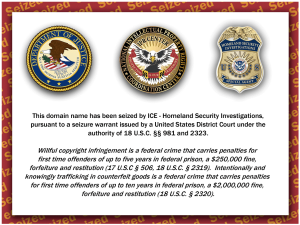There has been quite a bit of heated debate on the potential implications of both PIPA and SOPA in the past couple weeks. Opponents argue that with the passing of these two bills, the United States would enter a new era of unsolicited government censorship that would emulate the current standards of DNS blocking exhibited in countries like Iran, China, and Syria. Proponents, on the other hand, insist this is simply a means of ensuring that the rights of copyright holders are upheld, but what do they really mean for us?
PIPA, otherwise known as the Protect IP Act, and SOPA, the Stop Online Piracy Act, are two bills proposed in the U.S. Senate and the House of Representatives, respectively, which are designed to provide the government and copyright holders with powers to block access to “rogue websites dedicated to infringing or counterfeit goods,” with an emphasis on those registered outside of the United States. The acts would also allow for copyright holders to sue for the deletion of that Internet service, permitting a “directory, index, reference, or hypertext link” is found to distribute content without permission. This would in turn, render it unsearchable on search engines and impossible to access with United States DNS servers. Additionally, ordinary users like you and me could be imprisoned for up to five years for posting copyrighted work without prior approval from the copyright holder.
Since its introduction, the Department of Homeland Security’s Immigrations and Customs Enforcement (ICE) division has been running it’s campaign “Operation: In Our Sites”, as a means of seizing domain names used in alleged criminal copyright infringement activities. Now, although most of the domains seized by ICE appear to have been engaged in music and movie piracy or the sale of counterfeit products, the threat of coming to work one day and finding your website, which for this particular example hosts some amount of user-generated content, is replaced by a banner stating: “This domain name has been seized by ICE – Homeland Security Investigations, pursuant to a seizure warrant issued by a United States District Court under the authority of 18 U.S.C. §§ 981 and 2323”, still exists. In the past year alone, ICE has seized more than 150 domain names for alleged copyright infringement. A number that has led critics to question where the line between an infringing and noninfringing site can be drawn. David Sohn, senior policy counsel at the Center for Democracy and Technology, an online civil liberties group that has criticized the ICE seizures, advises websites with any amount of user-generated content to at least consider the possibility of a ICE takedown. If PIPA and SOPA do in fact come into fruition, companies like FaceBook, Twitter, YouTube, and Flickr, who unintentionally host thousands of unlicensed copyrighted material will be forced to begin censoring users or shutdown.
Of all the adverse side effects resulting from the passing of SOPA(or PIPA), the most vile is that it would effectively nullify the safe harbor provisions in the Digital Millenium Copyright Act (DMCA). In addition to criminalizing the production and dissemination of technology, devices, or services intended to circumvent measures (commonly known as digital rights management or DRM) that control access to copyrighted works (this is applicable whether or not there is actual infringement of copyright itself), the DMCA is also responsible for heightening the penalties for copyright infringement on the Internet. It’s not all negative, however. The DMCA’s second title, the Online Copyright Infringement Liability Limitation Act, is responsible for creating a safe harbor for online service providers and internet service providers against copyright liability provided they adhere to prescribed safe harbor guidelines and promptly block access to allegedly infringing material (or remove such material from their systems).
I’ll be honest, these bills scare the hell out of me. To accurately understand the scale of what Congress is proposing requires an understanding of issues presented here in far greater detail than I could have ever hoped to depict in these few hundred words. Yes, file sharing services like MediaFire and RapidShare, which are arguably responsible for the trafficking of millions of copyright infringing files each day, would be eliminated, but at what cost? The general assumption is that following the death of these services, legitimately-licensed services will flourish and our country’s copyright creators will begin to earn more money, but is is all just a naive supposition? After all, we’ve been exposed to services like Napster, LimeWire, and MegaUpload for years now. We’ve been allowed to get something for absolutely nothing that at one point cost something. The idea of people simply giving in and going back to paying for music, while idyllic, is far-fetched and unfortunately, PIPA and SOPA are the not the answer (This is the topic for another post entirely). How could a social media service, such as Twitter or YouTube, even begin to attempt to block all infringing content, without simply shutting down. The idea of making services preemptively responsible for what people do with their products, while albiet fanciful, is completely impractical. Imagine a world where anyone can sue to have a service deleted every time their video/song/work is copied, distributed, or viewed without permission. Lawsuits would not only double, but quadruple.
For years, we’ve used legislation as a means to “promote prosperity, creativity, entrepreneurship, and innovation” without the novel realization that after all the red-tape and watermarks clear, all we’ve really done is succeeded in further stifling that which we set out to protect.

